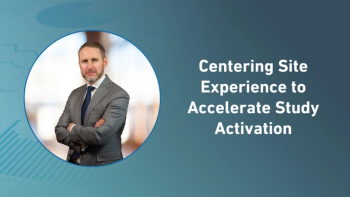
TransCelerate: Perspectives for Addressing Patient-Clinical Trial Access Opportunities
In this interview, Christa Polidori, Clinical Trial Disclosure Manager at Bristol-Myers Squibb and a leader for the TransCelerate Clinical Research Access and Information Exchange Initiative, will discuss the TransCelerate proposal in greater detail.
TransCelerate is advocating for the inclusion and disclosure of site contact information on clinical trial registries as a practical advance toward better connection between patients and clinical trial opportunities. Supported by research recently published in DIA TIRS, TransCelerate proposes that clinical trial sponsors have an opportunity to partner with investigative sites across the globe to ensure that clinical trial registries include a transparent and unambiguous method of contact for each participating clinical trial site location. In this interview, Christa Polidori, Clinical Trial Disclosure Manager at Bristol-Myers Squibb and a leader for the TransCelerate Clinical Research Access and Information Exchange Initiative, will discuss the proposal in greater detail.
Moe Alsumidaie: What prompted TransCelerate to investigate and partake in the Clinical Research Access and Information Exchange Initiative?
Christa Polidori: TransCelerate was founded with a mission to collaborate across biopharmaceutical companies and R&D communities to identify and help implement different solutions to drive the delivery of new medicines. Early on, TransCelerate recognized the process of searching for clinical trials to be complex, not only for patients but also for caregivers and healthcare providers. This is largely because information about clinical research and opportunities is often difficult to understand and navigate, especially for patients. Research shows a discrepancy in the number of individuals that are willing to participate in a clinical trial and those who enroll. This indicated to us that there could potentially be a gap in the awareness, availability, and/or quality of information made publicly available about clinical trials. Recognizing that patients are the most critical component to clinical research, TransCelerate saw a unique opportunity to take a patient-centric approach and build greater awareness and access to clinical trial information. Our Initiative targets TransCelerate’s strategic priority of improving the clinical trial experience by better informing patients of clinical trial options. It seeks to provide increased visibility into information about clinical trial options while also contributing to a more rewarding clinical trial experience through improved exchange of information with trial participants.
MA: Your research reported that 76% of patients indicated that site contact information was very important, demonstrating a potential opportunity to provide information that is wanted by patients. What can sponsors and other clinical research stakeholders do to help address this challenge?
CP: Sponsors can approach registry data as a patient facing tool, and partner with investigative sites across the world to determine the best method of making site contact information available to patients through registries. Based on some of the data that we have gleaned from our stakeholders, we provided several possible options for sponsors and investigative sites to consider, and provided those in our recent papers. Ultimately the goal of any of these options is for sponsors and sites to work together to empower patients, healthcare providers and other stakeholders to learn more about clinical trials. It is important to better utilize existing fields on registry platforms, such as the central and site contact fields that are present on registries such as ClinicalTrials.gov to ensure that patients are provided with the most efficient means to directly connect with a clinical trial site.
MA: Your survey also reported that 86% of healthcare providers expressed positivity towards clinical research, yet, less than 50% had discussions or made clinical trial referrals. What can be done to address this issue?
CP: We can encourage conversations about clinical trials between patients and their healthcare providers. Sponsors can play a role in this by equipping healthcare providers with helpful tools to engage in more frequent and fulfilling conversations with patients, regarding clinical research and specific clinical trial options. TransCelerate is currently exploring ways to ensure providers have the right information and resources needed to make this happen. TransCelerate is also considering ways to collaborate with academia and research institutions to study the dynamics of current conversations between providers and patients, which often do not include clinical trials as an option.
MA: The TransCelerate research suggests that patient advisory boards have expressed patient disappointment when they hear they are not eligible for a study. Do you see room for improvement and an actionable next step for mitigating this perceived setback?
CP: We know, from discussions with patients on our patient advisory board, and also from anecdotes we’ve heard from other patients we have collaborated with individually, that when a patient is told they are ineligible for a clinical study, after they spent time searching for a trial and evaluating options, it is like going back to square one; they feel they’ve wasted time and progress in their search efforts. Patients also told us that when this occurs, they want to feel like they are still moving towards some desired outcome, even if that's not the trial option that they originally looked at. Ideally, there needs to be some way of keeping a patient moving forward in a positive direction, and care should be taken to provide patients with alternative options, suggested medicines, next steps or outlining a plan for what the patient can do next. In our paper, we reported that patients would be interested in registering their contact information on a secure website and be notified of other trial opportunities. This could be one way that sponsors could help patients move forward. I think every situation that a patient faces, is unique and there could be a variety of other hurdles or burdens that complicate the trial process. So, when we are looking at these options, we must look at the full journey from beginning to end, identify what hurdles patients could potentially face and consider solutions for each of them.
MA: How does TransCelerate plan to address potential communication opportunities?
CP: We will continue to advocate that sponsors and investigative sites partner together to better link patients to clinical trial sites and ultimately spur more patient-centric clinical trial search. We see greater visibility of site contact information as a practical first advance towards the goal of more patient-centric clinical trial registries. Our future efforts focus on using the data that we have obtained from our surveys and patient advisory boards to improve the consistency and the usefulness of the information that is present on the registries and ultimately improve the overall patient navigation through clinical trial registries.
Moe Alsumidaie, MBA, MSF is Chief Data Scientist at Annex Clinical, and Editorial Advisory Board member for and regular contributor to Applied Clinical Trials.
Newsletter
Stay current in clinical research with Applied Clinical Trials, providing expert insights, regulatory updates, and practical strategies for successful clinical trial design and execution.




